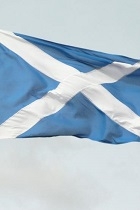Naval Chiefs: Scottish independence will do 'immense damage' to Forces

Five former First Sea Lords warn defence plans for an independent Scotland are unachievable and will leave the new country badly defended.
A 'Yes' vote in the Scottish independence referendum would leave Scotland poorly defended and do "immense damage" to Britain's Armed Forces, five former First Sea Lords have warned.
The SNP’s defence plans are unachievable, will cost jobs and would leave an independent Scotland's new military struggling for decades.
The former Naval leaders also predict any independent Scottish armed forces will have difficulties recruiting and the split will be seen as “an act of destruction” by many in the military.
The grave warning from the Royal Navy establishment in a letter to Saturday's Telegraph follows a string of similar cautions from senior military figures that independence will damage national security both sides of the border.
Adml Sir Mark Stanhope, Adml Sir Jonathon Band, Adml Lord West, Adml Lord Boyce, Adml Sir Jock Slater and Vice Adml John McAnally, President of The Royal Naval Association, write that Britain’s Armed forces are “a force for good”.
Splitting the Union “would do them immense damage”.
Their intervention comes as polls show the two camps are neck and neck ahead of Thursday’s referendum.
The Scottish Government has said once independent, Scotland would expel Trident, Britain’s nuclear submarine deterrent, by 2020.

It would have a new Scottish defence force with a budget of £2.5 billion a year. Its navy would include two frigates and four mine hunters, while its air force would include at least 12 Typhoon jets.
A decade after independence, Scotland would have a total force of 15,000 regular and 5,000 reserve personnel according to the plans.
But the letter says the “grave implications of separation from the UK for security and defence-related employment in Scotland have not been spelt out to voters”.
It brands the defence plans “unachievable within their planned funding and timescale”.
A split would take Scotland “decades” to find substitutes for training, procurement and administrative infrastructure left behind in England, they predict.
The letter also predicts that any new defence forces in an independent Scotland would struggle to recruit.
“Nor do we believe anything like the 20,000 personnel envisaged will be attracted by the career opportunities offered by solely Scottish Armed Forces. Rather the best may leave altogether seeing the split as an act of destruction and leadership failure leading to the loss of premier league capability for ever,” the letter says.
Jobs would be lost at Faslane and at Scotstoun and Govan, under a split, the letter predicts. Orders for 13 new Royal Navy frigates may well not be placed in an independent Scotland.
“Scottish Navy orders would be no substitute, nor are exports likely to close the gap.”
Overall, the letter warns “Scottish separation will entail many lost jobs and leave Scotland very poorly defended in an increasingly dangerous world, especially as the SNP’s policy on nuclear weapons could render it ineligible for Nato membership”.
Adml Sir George Zambellas, current head of the Navy, warned earlier this year that independence would “damage the very heart” of Britain’s maritime defences.
It is not only Navy chiefs who have warned of the defence impact of separation. Gen Sir Richard Shirreff, the former deputy supreme allied commander in Europe, said earlier this month that the Scottish Government’s defence plans were “amateurish, unrealistic and lacking any clear strategic purpose”.
The SNP’s Keith Brown dismissed the warning as “scaremongering" and said it confirmed "the entire Westminster establishment is in a state of panic as the polls tighten and more and more people switch from No to Yes".
He said: “The fact is that a Yes vote means we will have a defence and naval policy which works in Scotland’s interests and means we can get rid of the obscenity of Trident from the River Clyde– rather than one run by Westminster which sees Scotland as an afterthought and can’t even defend our coastline properly.”
*Original story: The Telegraph via Google News (search term: Naval)
*Image credits: Wikimedia & Flickr![]()

Post your comment
You cannot post comments until you have logged in.
Login to post a commentComments
No one has commented on this page yet.
RSS feed for comments on this page | RSS feed for all comments